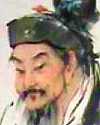 (source)
(source)
|
Chuang Tzu
(c. 369 B.C. - 286 B.C.)
Chinese philosopher , often seen as Zhuangzi. Chuang was his surname and Tzu (or Tse) indicates master, thus he was called “Master Chuang”. A work which bears his name, the Zhuangzi, is one of the defining texts of Taoism. He lived during the Warring States period. It was during this time that Chinese philosophy most flourished.
|
Science Quotes by Chuang Tzu (10 quotes)
Beneath multiple specific and individual distinctions, beneath innumerable and incessant transformations, at the bottom of the circular evolution without beginning or end, there hides a law, a unique nature participated in by all beings, in which this common participation produces a ground of common harmony.
— Chuang Tzu
A.W. Grabau, Stratigraphy of China (1928), title page.
Do not struggle. Go with the flow of things, and you will find yourself at one with the mysterious unity of the Universe.
— Chuang Tzu
Quoted in Kim Lim (ed.), 1,001 Pearls of Spiritual Wisdom: Words to Enrich, Inspire, and Guide Your Life (2014), 184
Great knowledge embraces the whole: small knowledge, a part only. [Great knowledge encompasses everything. The little one divides everything.]
— Chuang Tzu
As translated from the Chinese original by Herbert A. Giles in Chuang Tzŭ: Mystic, Moralist, and Social Reformer (1889), 13. The brackets contain a translation from a version written in Spanish on the website frasesypensamientos.com.ar
The fish trap exists because of the fish; once you’ve gotten the fish, you can forget the trap. The rabbit snare exists because of the rabbit; once you’ve gotten the rabbit, you can forget the snare. Words exist because of meaning; once you’ve gotten the meaning, you can forget the words.
— Chuang Tzu
As translated from the Chinese original by Burton Watson in The Complete Works Of Chuang Tzu (1968, 2013), 233.
The seeds of things have mysterious workings. In the water they become Break Vine, on the edges of the water they become Frog’s Robe. If they sprout on the slopes they become Hill Slippers. If Hill Slippers get rich soil, they turn into Crow’s Feet. The roots of Crow’s Feet turn into maggots and their leaves turn into butterflies. Before long the butterflies are transformed and turn into insects that live under the stove; they look like snakes and their name is Ch’u-t’o. After a thousand days, the Ch’u-t’o insects become birds called Dried Leftover Bones. The saliva of the Dried Leftover Bones becomes Ssu-mi bugs and the Ssu-mi bugs become Vinegar Eaters. I-lo bugs are born from the Vinegar Eaters, and Huang-shuang bugs from Chiu-yu bugs. Chiu-yu bugs are born from Mou-jui bugs and Mou-jui bugs are born from Rot Grubs and Rot Grubs are born from Sheep’s Groom. Sheep’s Groom couples with bamboo that has not sprouted for a long while and produces Green Peace plants. Green Peace plants produce leopards and leopards produce horses and horses produce men. Men in time return again to the mysterious workings. So all creatures come out of the mysterious workings and go back into them again.
— Chuang Tzu
An ancient consideration of transmutation of species, which—over two millenia ago—anticipated the modern theory of evolution. As translated by Burton Watson in The Complete Works Of Chuang Tzu (1968, 2013), 143-144.
The sky looks very blue. Is that its real color, or is it because it is so far away and has no end? [For whether the blue of the sky is its real colour, or only the result of distance without end.] [Is this immense blue of the sky its true color or is it the effect of infinite distance?]
— Chuang Tzu
As translated from the Chinese original by Burton Watson in The Complete Works Of Chuang Tzu (1968, 2013), 1. In first brackets, as translated by Herbert A. Giles in Chuang Tzŭ: Mystic, Moralist, and Social Reformer (1889), 1-2. In second brackets, as translated to English from a version in Spanish on website page at frasesypensamientos.com.ar.
The wise man looks into space and does not regard the small as too little, nor the great as too much, for he knows that there is no limit to dimension.
— Chuang Tzu
As translated from the Chinese original by Herbert A. Giles in Chuang Tzŭ: Mystic, Moralist, and Social Reformer (1889), 202-203.
There is no bandit so powerful as Nature. [The interaction of the positive and the negative principles, which produces the visible universe.] In the whole universe there is no escape from it.
— Chuang Tzu
Chuang Tzu: Mystic, Moralist and Social Reformer (1889), trans. Herbert A. Giles, 303. The brackets indicate a sentence printed as a paragraph in smaller type size.
Vast as is the universe, its phenomena are regular. Countless though its contents, the laws which govern these are uniform.
— Chuang Tzu
As translated from the Chinese original by Herbert A. Giles in Chuang Tzŭ: Mystic, Moralist, and Social Reformer (1889), 135.
You can’t discuss the ocean with a well frog—he’s limited by the space he lives in. [A frog in a well cannot conceive of the ocean.]
— Chuang Tzu
As translated by Burton Watson in The Complete Works Of Chuang Tzu (1968, 2013), 126. A free translation is given in brackets.

 In science it often happens that scientists say, 'You know that's a really good argument; my position is mistaken,' and then they would actually change their minds and you never hear that old view from them again. They really do it. It doesn't happen as often as it should, because scientists are human and change is sometimes painful. But it happens every day. I cannot recall the last time something like that happened in politics or religion.
(1987) --
In science it often happens that scientists say, 'You know that's a really good argument; my position is mistaken,' and then they would actually change their minds and you never hear that old view from them again. They really do it. It doesn't happen as often as it should, because scientists are human and change is sometimes painful. But it happens every day. I cannot recall the last time something like that happened in politics or religion.
(1987) -- 


